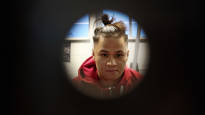Don Lindgren sits on the sofa of an apartment building in Uusikaarlepyy with a miniature schnauzer on his lap Tyson.
He takes a deep breath, collects his thoughts and begins to tell Kälvia about the game trip, when the audience full of young people jumped onto the ice to challenge Munsala IK’s barely-teenage junior players.
Why did they want to fight?
– I think it started because of my different background. We then answered them in Swedish, and it was even more annoying, says Lindgren, who was adopted to Finland from Thailand at the age of two.
Lindgren says he had a typical Finno-Swedish upbringing in the countryside of Ostrobothnia – but on the ice he stood out from the rest. And not everyone liked that.
In his own team, Lindgren always felt safe.
When he got on the bus in Uusikaarlepyy on his way to away matches, he knew what to expect.
Watch Don Lindgren’s story about hockey racism in Finland in the Sportliv program:
Incidents have also occurred in adult series. Lindgren talks about an away match that turned ugly after a heated goal-scoring situation. The situation started with light mouthing, but quickly escalated.
The opponent said the n-word right in the face. According to Lindgren, the judge was standing next to him after hearing the insult.
Lindgren asked the judge: Didn’t you hear what he said?
The referee stared at Lindgren, turned his back and skated away.
– I told the coach that I was leaving. Because if that’s how it can work, gaming won’t be fun anymore. In that moment, I felt quite small.
“I grew up with racism”
About 35,000 matches are played annually under the ice hockey association. The number of reported racism suspicions is usually 10–15.
But there are unreported cases – and a lot, believes Lindgren. For example, the two cases mentioned above were never taken forward. What happened on the ice, stayed on the ice.
Why report if the player’s words to the referee fell on deaf ears? The situations where the word is against the word are the most challenging to solve and they very rarely lead to punishments.
As in the notorious Pelicans case last fall, when a 13-year-old player from Lahti told that he had been racially insulted. The only one who got punished was the team that intervened in racism and its coach.
The events do not surprise Don Lindgren.
– I grew up with racism.
He sincerely hopes that the Ice Hockey Association will use hard measures in anti-racism work.
– It would be really sad if a promising junior career ends because of racism.
“How is logging in Africa going?”
Don Lindgren is not the only Northlander who has been slandered in the puck rink. Two years ago, a nerdy junior Leo Brannback said in the Spotlight program that he was used to insults.
– I get to hear them very often.
Spotlight contacted ten Swedish and bilingual clubs and asked whether the club’s B and C juniors have experienced insults or bullying in the rink. About half of the 58 respondents said they had seen a teammate become a victim of racism.
In the same article, IFK Lepplax player Jon Wikstrom said he hasn’t heard any inappropriate words on the ice. The following year, the situation was different.
In October 2021 Jon and Manuel Wikström was racially taunted in the match. What did they hear?
Coach of IFK Lepplax Keijo Mäkitalo remembers the incident well. He thinks the Ice Hockey Federation settled the matter, but is not aware of the consequences.
– We didn’t get a report on how it went, and we weren’t part of the process. Of course, we tried to monitor within the team if the player in question was involved in the matches or not, says Mäkitalo.
The case should have been clear because the referee held the player down while he was yelling abusive words.
Mäkitalo does not criticize the union’s actions, and says he trusts that the cases will be settled fairly. He also says that the opposing team commendably took responsibility for what happened.
– We had a good dialogue with them. They said they will take action regardless of what the union does.
Director of junior and club activities of the Ice Hockey Association Tuukka Tervomaa says that the union has zero tolerance for racism. At best, the association is working on new, clearer anti-racism guidelines for referees, players, coaches and organizers.
Tervomaa says that the judge has a duty to report, regardless of whether he himself hears the racist words or not. It is enough for the player or coach to say that they heard something.
– After that, the normal process begins, where the disciplinary officer starts to find out the matter. It includes written reports, if necessary, interviews, etc. Yes, there will be quite a big project done for that, says Tervomaa.
An honest answer was interpreted as a joke
The chain friend of the junior years Leo from Komarov unlike Don Lindgren, he didn’t grow up a disc millionaire. But the sport has still given a lot: friends, exotic experiences and memories.
– I am really happy with everything I have achieved, says Lindgren.
He is currently playing in Manila, the capital of the Philippines. One day, his teammates asked if he had experienced racism in Finland. Lindgren did not mince words in his answer.
– I answered that I hear the n-word quite often. They thought I was kidding, but I said yes it was. Unfortunately, that is my experience of Finnish junior hockey.
